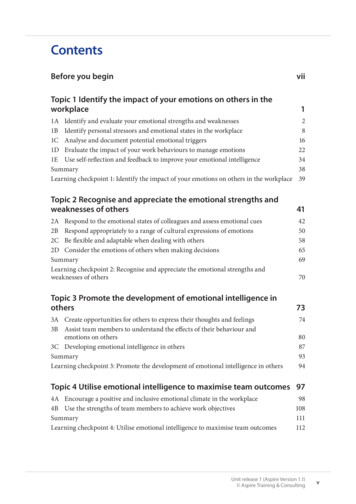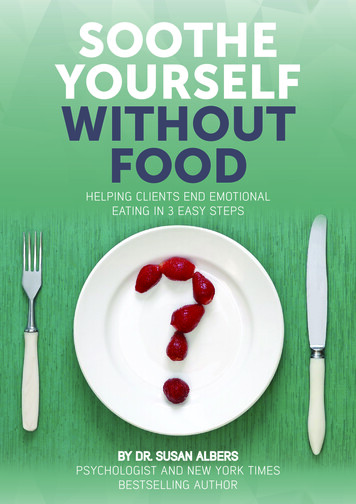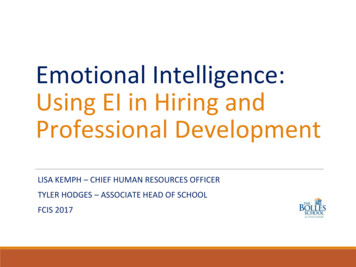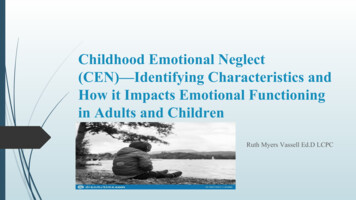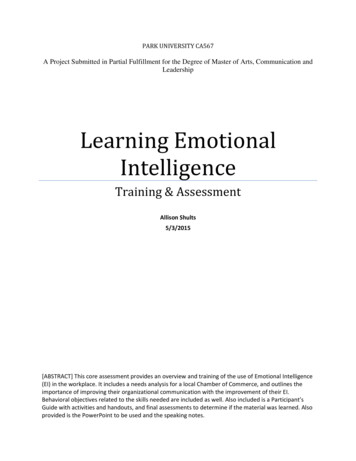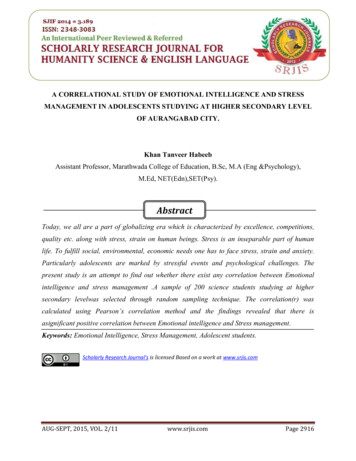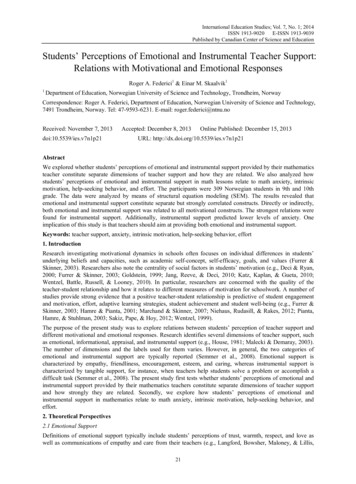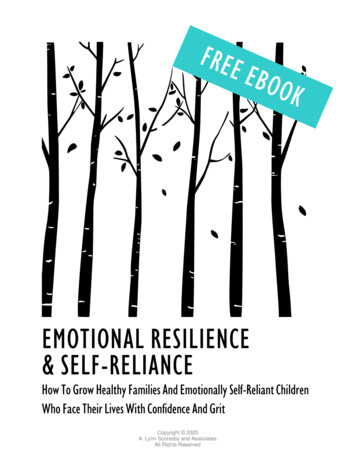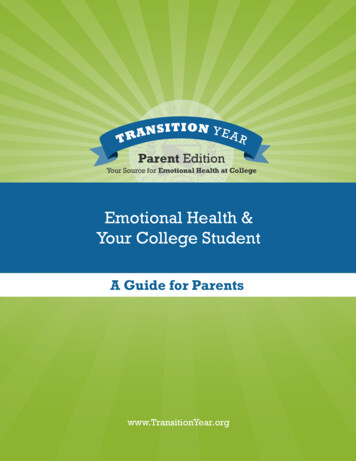
Transcription
Parent EditionYour Source for Emotional Health at CollegeEmotional Health &Your College StudentA Guide for Parentswww.TransitionYear.org
Your Source for Emotional Health at CollegeTable of ContentsEmotional Health & Your College Student:A Guide for ParentsLetters to Parents .1-2Four Things Every Parent Must Know . 3Choosing a College . 5The Push-Pull of Independence . 13Adjusting to Student Life . 16Signs of Stress . 20How to Help . 24Mental Health Conditions . 31College Suicide . 42Students with Diagnosed Mental Health Problems . 45The Proactive Parent . 51Everyone Graduates . 53Thanks & Acknowledgements; Important Resources . 54
:stneanraPe marksgelloDearcool thood tom childigh schoity,fromhpportunthe pathition froos,gnenagorltnaaeThe.toneof chnt miles d with a sensechallengatdrnoapssmitrepleod. Courtainty, sadultho se comes unceatnizes th lege,migoorcperdnnaol to colundatioooFhccsirthaychim higrican Psition frosenmarAttenThrtahe impor,during t ten need help.Togethe.noiftoaFoundfamilieshethe Jedhtirstand tweddenruesnttarentakehy we p ide to help pare — and uctivecafThat’s wsutgnd prodted thisir studewe crea challenges the rage healthy anualnd encoemotionatroppsuss,action to ars.with strelaeeydedglith acollea chchild wi ital.helpingarrofofsepritrring ca g informed is vu needeofysrnaerhttce toWhee for, beinal advic ealth condition valuable resourcitcarporeatal har will bed menseYonngoiatiisdan.e the Trjourney’sdlihWe hopcgering youive colletrcuudduoorynd pealthy ahre.alyifamthe futurruofotyshehe bWe wisand all tecneirexpely,SincereirectorfDBoard o, MDnnooistlaedxAFounAlan A.chiatricysPnacAmeriTransition Year Parents Guide Page 1
ts:neraPraDeuntous amo .dnemerllegest a ten to cowe inver,dslieihticnrg oummuds and co esources gettin ing, we may fineilimdrenafrAsour chill plannturgy andfneeernvaeecr,epthatof timve ande issuese our lothitprsofeddYeteparees unprvlesrunce,oeding.epende sedcnicustsnfromdentpreselarly stu s —llege reuocci,trelapp—ltiepeot young rowth. For some motional difficu us, time.For mosogerging e h, even dangeron, andimtaerrolopextougstingwith exidinarilyomdealing n be an extraorsition frnartaxcemplancollegeut the co shows parents cobaswncees ton knoundatio e. Our experie on and resourcoFdJeatinalThelleght inform tect the emotioool to cogihrcsehhtgoihvingnd prfrom haan for, a n.lp,etbenefitapem anticie childralhelp the eir college-agl medic s onanhtoifsosheprofhealtoritieplace of nput from authehtekyourd with ig can tasmootheniunhogtiyospnerlWhilee was d hope it will hework foddinuugorsightme.y theh. Weadvice,e, and la s for years to cotal healtgneellmocen totimecollegtransitioductive’sordlpihdcnownhy ally healtanoitoematow,ionDonna S he Jed Foundat,TFounderTransition Year Parents Guide Page 2
Your Source for Emotional Health at CollegeFour Things Every Parent Must KnowFour Things Every Parent Must KnowAbout Emotional Health1. It Affects You:Most of us assume that our children — as they move into the excitement and opportunityof their college years — are emotionally healthy and thriving. It’s easy to think of illnessessuch as depression, addiction or even suicide as problems that affect other families notour own. In reality, studies show that emotional issues, from stress and anxiety to conditionslike depression and eating disorders, are a leading impediment to academic success amongcollege students today.In a study commissioned for this project, most parents stated that any teenager can developa mental health problem. But nearly two-thirds of these parents didn’t think their child waslikely to experience one.Then who will?It’s very likely that all college-age students will deal with emotional health issues in some way,whether themselves or with a friend. Take time to better understand the emotional pitfallscollege students can face — and the role you can play in protecting your child’s emotionalhealth. This is vital for every parent and family.2. The Sooner, The Better:When young people are struggling emotionally, it can be tough to differentiate betweenthose who need better coping skills or a stronger support network, and those who may bedealing with a larger mental health issue. Either way, it’s prudent to reach for help at the firstsigns of trouble so that communication, lifestyle changes and, if necessary, treatment canbegin before a student is in distress. If you are concerned about your child or another youngperson, talk to them, and seek help before the situation worsens.3. The Stakes are High:For many students, emotional problems mean missing out on academic and social opportunities. For others, the stakes are much higher. Unaddressed mental health issues can leadto substance abuse and other dangerous behaviors; even suicide. Suicide is the secondleading cause of death among college students. If you are concerned about a young personin your life, don’t put off addressing the issue — there’s far too much at risk.Transition Year Parents Guide Page 3
Four Things . , cont’d4. You Can Help:Talking about issues like mental health and suicide can be tough. Studies show most parentsare less comfortable talking with children about mental health than about other health topics. But you have the power to make a profound difference in your child’s life by starting adialogue today. Remember, illnesses like depression, ADHD, bipolar disorder and anxietydisorders are real, treatable medical conditions. Helping someone address a problem andseek help is the first step to ensuring they survive and thrive.Transition Year Parents Guide Page 4
Your Source for Emotional Health at CollegeChoosing a CollegeWhat’s Inside?This chapter deals with the college selection process. It highlights questions to ask abouta school’s approach to emotional wellness - and its resources - something families oftenoverlook in their traditional school search.Finding the Right FitChoosing a college is a personal, and stressful, decision for students and their families. Youwant your son or daughter to have the best college experience possible, academically, socially and emotionally.Yet of all the college guidebooks and admissions pamphlets families review during the application process, very few will comprehensively address the mental health resources you’d want tohave in place for your child if and when needed. Many familiesnever give it more than a passing thought.Fast FactMore than half of all parentssay a school’s mental healthservices had little or noinfluence on their family’scollege selection process.1When choosing a college, other considerations naturally takeprecedence. What major is the student thinking about? How dohis or her SAT scores measure up? What are the costs of tuitionand room and board? As the process moves forward, other criteria become part of the equation. A large number of these factors do in fact have the potential to significantly affect yourchild’s emotional health at college. Taking the time to focus on emotional wellness whenlooking at prospective schools — and thinking about your child’s transition — can be criticalin preventing or addressing potential problems.Consider ThisIt’s important to have an open dialogue with your child about how the characteristics of aschool may affect his ability to acclimate, navigate and thrive. You know your child best; helphim assess his needs, personality and comfort level.College SizeDoes your child feel most comfortable surrounded by people? Does sitting in big classesfeel less pressured? Or does she prefer a quieter environment, with more potential for oneon-one attention?Transition Year Parents Guide Page 5
Choosing a College, cont’dCollege LocationDoes your child prefer being in a major city, with all that metropolitan areas have to offer? Haveprevious big city experiences been energizing or unnerving? Does your child’s intended major or extracurricular activities suggest an urban or rural setting? Is it important that your childremain close to home?Student CommunityDoes your child require a close-knit student community with people who feel “just like me?”Or would your child appreciate being part of an ethnically, culturally or racially diverse environment? Would being part of a group of under-represented minorities create feelings ofdiscomfort? Is it important that your student be part of an atmosphere that’s accepting of hisor her sexual orientation?SocializationQuick Tip!Is your child choosing a school where his high school friends willGoogle It! Read campusbe present; or are the students going in different directions? Exnewspapers online. It’s a goodamine together the emotional dynamics of those arrangements.way to learn about events andWhen looking at schools, think about the social tone of a prospecissues that may not have madetive school and how students connect and socialize. Does makingthe mainstream press.friends require active participation in groups and clubs? Is theschool dominated by a Greek system, or are dorms the socialhub? What are the frequency and policies toward student drinkingand off-campus partying? Does the college or town have the facilities to support your child’sextracurricular interests, such as safe and well-maintained swimming pools, bike paths, sportsfields, ice rinks, tennis courts and the like?Other ConsiderationsToday, the costs of college can create their own level of stress. Have an open discussion aboutfinances as part of planning for college. Consider stresses to the whole family unit, or problems that could occur if your child has to supplement income with a part-time job. Safety isanother element that can add weight to college decisions and transitions – and create stress.Find out more about what your college is doing to prevent crime on campus and to keepstudents secure.Transition Year Parents Guide Page 6
Choosing a College, cont’dThe Importance of Wellness Philosophy & ServicesAfter you’ve considered the academic and social life on a particular campus, dig deeperto understand the school’s approach to mental wellness. College students often have somebig issues to deal with. Find out more about who will help them when you are far away. Takeit upon yourself to examine the school’s approach to student mental health. Evaluate eachcollege by the availability, sophistication, and specialization of mental health programs andservices on campus.Transition SupportFast FactMany schools offer programs during orientation and freshmenyear to help students acclimate to college and support them during the emotional transition. Find out what programs prospectiveschools offer to help students thrive on campus.Residential LifeOnly 25 percent of parentsreport receiving informationfrom their children’s currentor prospective colleges aboutmental health services. 2Residential Advisors (RAs) are often the first people to spot signsof trouble in a student, or identify a problem before it escalates.Find out more about who they are, how they were trained andhow they interact with students.CounselingShould your student need help, find out what resources are available for students dealing with stress or emotionally difficult situations. Does the school provide psychologicalcounseling or support groups? What are the student/provider ratios and counseling centerhours? Does the center deal primarily with day-to-day college stressors like time management, relationship issues or sleep difficulties, or is it resourced to address more seriousconcerns including anxiety, ADHD, depression and substance abuse?Quick Tip!Orientation: After your student has chosen a college,consider arranging for a second, deeper level oforientation, especially if you are concerned about yourchild’s transition. Meet and talk with support people,RAs, student counseling and other resources about theirservices and availability.Transition Year Parents Guide Page 7
Choosing a College, cont’dCheck PointIf your child has been diagnosed with a mental health condition, has had previous emotional difficulties or has experienced problems with drugs or alcohol, it is important thatyou look even closer at mental health resources and campus policies when selecting acollege. Turn to page 45 for additional information and resources.Wellness Philosophy & ServicesQuestions to Ask: What is the college’s philosophy and policy concerning mental health, and what programs,services and resources are in place to back it up? Does the school offer educational programs — such as workshops or talks — about mentalhealth and wellness? Are there classes, credit-bearing or otherwise, on transitioning to college or developinglife skills? How accessible are academic advisors and student affairs staff? Are the school’s counselors accessible? Do counselors offerdrop-in hours and appointments?Learn More! What specific mental health services and staff does the campus health center provide?Parents and their children turnto The Jed Foundation to learnmore about campus mentalhealth resources at over 1,400colleges and universities acrossthe country. To learn more aboutyour prospective schools’ mentalhealth resources, go to:www.ulifeline.org. Is there 24-hour emergency care, should a problem arise atnight or over the weekend? Is there a staff psychiatrist oncampus to prescribe medication? Important! Find out which services are covered by studentfees or health insurance, and whether the college or university requires students to carry its own proprietary healthinsurance. Examine your child’s current insurance policy todetermine what types of mental health services are coveredand the guidelines for reimbursed care. Under what circumstances will the college notify a parentregarding a student’s mental health? What happens when aparent contacts the college with concerns about their child?Transition Year Parents Guide Page 8
Parent EditionYour Source for Emotional Health at CollegeRight Fit WorksheetBased on your student’s answers, this worksheet will help you determine the emotional fit level of a school.Once completed, refer to the Grading Key to calculate your Right Fit Score.School Name:Right Fit Score:General InformationLocation:Distance from Home (circle one):NearDiversity of Student Body:Environment (circle one):RuralSchool Size:Personality:Annual Tuition:FarUrbanThe basic culture and demographic of this school for me is (circle one):a) A good fitb) A manageable fitc) Not a fitNotes:Tuition to attend this school would (circle one):a) Not be an issueb) Be stressful, but manageablec) Very stressfulNotes:Academic SupportClass Size:Advisor System:Transition Year Parents Guide Page 9
Parent EditionYour Source for Emotional Health at CollegeRight Fit WorksheetTutoring/Support Program:Academic Intensity:Academically, I feel like this school is (circle one):a) A strong fitb) An ok fitc) A poor fitNotes:Student LifePopular Activities / Organizations (circle all that apply):Greek LifeSportsCulture GroupsHousing (circle one):Academic ClubsMostly DormsCommunity ServiceMostly Off-CampusBased on cultural and social groups with which I identify (circle one):a) I see myself fully represented in campus activities/groupsb) I see parts of myself represented in campus activities/groupsc) I don’t see myself reflected in campus activities/groupsNotes:Based on my specific talents/interests/activities, this school has:a) Lots of outlets for meb) Some outlets for mec) Not enough relevant outlets for meNotes:Transition Year Parents Guide Page 10
Parent EditionYour Source for Emotional Health at CollegeRight Fit WorksheetTransition SupportNew Student Orientation:Know someone who is attending?YesPrograms that support Freshman:NoI feel like the transition to this school would be (circle one):a) Very smoothb) Manageablec) ChallengingNotes:Emotional WellnessGym:Cost: Hours:Health Center Information:Counseling Center:Wellness/Mental Health Programs:24-hr Mental Health Help?YesNoNearby Mental Health Resources?YesNoInsurance Coverage: Student Health Center Counseling AppointmentsOn-site support for pre-existingmedical/mental health conditions?YesNoThis Level of emotional and wellness support feels (circle one):a) Very Good/Supportiveb) Sufficient but not idealc) Insufficient/LackingNotes:Transition Year Parents Guide Page 11
Parent EditionYour Source for Emotional Health at CollegeRight Fit WorksheetGrading Key — Scoring Your Right Fit WorksheetOnce you have completed a Right Fit worksheet for a specific school, assign points to each of your answersbased on the follow grading key to find out what your Right Fit score with that school is on a scale of 0 – 100.General InformationThe basic culture and demographic of this school for me is:a) A good fitb) A manageable fitc) Not a fit0 pts5 pts10 ptsTuition to attend this school would:a) Not be an issueb) Be stressful, but manageablec) Very stressful0 pts5 pts10 ptsAcademic SupportAcademically, I feel like this school is:a) A strong fitb) An ok fitc) A poor fit0 pts10 pts20 ptsStudent LifeBased on cultural and social groups with which I identify:a) I see myself fully represented in campus activities/groupsb) I see parts of myself represented in campus activities/groupsc) I don’t see myself reflected in campus activities/groups0 pts5 pts10 ptsBased on my specific talents/interests/activities, this school has:a) Lots of outlets for meb) Some outlets for mec) Not enough relevant outlets for me0 pts5 pts10 ptsTransition SupportI feel like the transition to this school would be:a) Very smoothb) Manageablec) Challenging0 pts10 pts20 ptsEmotional WellnessThis Level of emotional and wellness support feels:a) Very Good/Supportiveb) Sufficient but not idealc) Insufficient/LackingTransition Year0 pts10 pts20 pts Parents Guide Page 12
Your Source for Emotional Health at CollegeThe Push-Pull of IndependenceWhat’s Inside?We review the changing dynamics of family relationships and offer suggestions for communicating with your college student as he or she experiences independent living.Your Changing RelationshipDuring the transition to college, your relationship with your child isn’t merely likely to change,it’s certain to change. New and evolving boundaries and major shifts in responsibilities mayfeel unfamiliar. For students, increased personal freedom seems at the same time wonderfuland frightening — as they seek to find balance between their own growing need for selfreliance and their desire for the comforting emotional presence of a parent.College students are navigators in the difficult waters that separate adolescence from adulthood. As they take more responsibility for their daily lives and develop life skills that are as vitalas any academic coursework, it’s important for you to remain a reliable source of support.Helicopter ParentingYou’re a caring parent who’s involved in your child’s life. Overthe years, you researched and sought out the best programs,the most enriching opportunities, and always got your childwhere she needed to be, fully prepared and on time. Youknew what homework assignments had to be done, when theywere due, and made sure everything happened in a wiselyprioritized and timely fashion. You regularly reviewed (andsometimes helped with) assignments. Perhaps you’ve alsointervened on behalf of your child, with teachers, friends orother adults. You did so because you care.Fast FactCollege-age children still think oftheir parents as a primary sourceof support when times get tough.An mtvU-Jed Foundation studyshowed 63 percent of studentswould turn to their parents if theyfound themselves in emotionaldistress.3Yet experts agree, when parents cross the line from caring tohovering, they inadvertently stifle their child’s coping capacities. Fortunately, it’s not too lateto get your child on the path to practical and emotional independence. How? When you talk,allow your son or daughter to set the agenda for some of your conversations. Work on techniques to give your child the space to build his own resiliency and decision-making skills.Transition Year Parents Guide Page 13
Push Pull of Independence cont’dA New Communication ContractParents and children both benefit from establishing expectations for communication while astudent is away. Have a conversation before your child goes away to school about how, andwith what frequency, you will communicate going forward. How often (daily, weekly, monthly, on an as-needed basis) do you expect to hear from yourchild? How frequently does your child want to hear from you? Many families agree to once-a-week phone calls. Work out a plan that fits your family’s needs. Email works well, especially given how different a student’s hours can be from his or her parents.Quick Tip!Students today are part ofa new, digitally connectedgeneration. Using email,instant messaging (IM) andmobile texting is sometimesless intrusive, and frees yourchild from the obligation oftaking your calls when heor she may be unable tospeak freely.Rules & LimitsAfter you’ve sorted out how you’ll communicate, tackle the subjectmatter by setting some basic guidelines: W hat decisions, challenges, choices or difficulties do you expectyour child to handle (at least at first) on his/her own? On which decisions will your child seek your input? A t what point and/or under what circumstances should your child askfor help? U nder what circumstances would your child would want a friend orroommate to call you or the counseling center?Productive First Phone CallsThe calls are inevitable. Take, for example, the story of the father whose daughter called himfrom 3,000 miles away when her car wouldn’t start. When your child calls you for help, walkthrough the problem-solving process. Have your child explain the problem; don’t interrupt. Offer cues: ‘How can I be helpful? What do you think you should do? What optionsare you considering?’ Help your child evaluate their choices, but don’t choose for them. If they still seem stuck, ask, ‘What do you imagine my advice would be?’ Assure them with supportive words like ‘I think you can handle this.’ At the same time,let them know that ‘No matter what, I’m here for you.’Transition Year Parents Guide Page 14
Push Pull of Independence cont’dYour child is experimenting with independent choices, but he or she still needs to know thatyou’ll be there to discuss ordinary events and difficult issues alike. Students don’t alwaysknow how much independence they can handle or how much support they will actually need.Be patient. Understand it will take time for everyone to find their footing in this evolving relationship dynamic, and design a new communications contract that works for the family.Check PointIf you notice significant changes in your child’s personality, don’t discount them as mere‘growing pains.’ Feeling sad, lonely, overly excited or anxious can be part of the naturaltransition. They can also be signs that need attention. For more information on the signs ofemotional distress, turn to page 20.Transition Year Parents Guide Page 15
Your Source for Emotional Health at CollegeAdjusting to College LifeWhat’s Inside?This chapter highlights the feelings and experiences students face during the transitionto college.The First Few WeeksAdjusting to college life often means dealing with many things for the first time — all at thesame time: learning to live with roommates, handling finances, taking care of householdchores, interacting with people from other cultures with other beliefs, trying out romanticpartnerships. This is in addition to new academic demands, such as learning how to studyeffectively, getting work done on time, and navigating the bureaucracy of a big institution.Through these tasks, college students learn how they respond to life’s daily challenges andfind the social and emotional support they need from the campus community, friends, andyou — their family — to make their way.Cronies and Care PackagesMost students’ initial concerns are about forming friendships. When new students lookaround, it may seem that everyone else is self-confident and socially successful, when inreality, everyone has similar concerns.Your child should find that within just a couple of weeks, some regular patterns — walkingthe same route to classes, eating at the same time with certain people — start to set in, making connections easier.Still, sometimes those first friendships don’t happen as quickly as your child would like. Assure them that meaningful, new relationships do not develop overnight. Discuss ideas forconnecting, such as leaving the dorm room door open when “hanging out,” inviting peopleto join them for a meal, or getting involved in campus activities. Help them understand thatall freshmen are new to campus life; people they reach out to will most likely be relieved tohave someone talk to them! While they’re sorting it out, don’t underestimate the restorativequalities of a care package from home, including notes and pictures from siblings, homebaked treats and popcorn they can share with dorm mates.Transition Year Parents Guide Page 16
Adjusting to College Life cont’dThe Give and Take of Dorm LivingAt the same time students are trying to make connections, they also need their own space. Living in close quarters with peers leaves students with little privacy but plenty of interpersonalchallenges. For many of them, the college dorm may be the first time in their lives they’vehad to share a room. This requires the kind of communication and negotiation skills manycollege-aged students haven’t yet mastered.Odds are, too, that your child and his roommate won’t necessarily be the best of friends. Discovering what makes his or her roommate tick and finding ways to live together can be oneof the most important learning experiences college provides.Greek Life, Service & ClubsJoining an intramural club or the Greek system — that is, fraternities and sororities — oncampus can give students a running start, and provide rewarding opportunities for campusinvolvement, community service and social development.Students who are involved in campus activities or service work often report having a betteroverall college experience. But remember: while your child’s social activities offer multiplebenefits, they also come with plenty of diversions. Whatever organization or activity yourstudent chooses, help them make sure it’s a healthy environment, one they can balance withother obligations. It usually takes new students most of a semester to be able to properlyevaluate their emerging interests and capacity for extracurricular involvement.As students explore the possibilities, parents can encourage them to embrace this time as achance to be authentically themselves. Indeed, if students felt pressured in high school to putup a front or blend in, in college they will relish the chance to discover their own uniquenessalong with a community of people they truly enjoy.As students will make their own choices, parents can encourage them to associate withgroups of people with whom they feel comfortable and who bring out the best versionof themselves.Academic PressuresOnce at college, your child will discover first-hand that college work is not just greater involume than high school work; it’s more intellectually demanding. Doing more work, moreindependently, is stressful. Complicating matters is the fact that, in today’s campus culture,sleepless nights are often a badge of honor and academic stress is the norm.Transition Year Parents Guide Page 17
Adjusting to College Life cont’dHelp your child think carefully about her academic course load. Even if they were in the topof her class in high school, college courses are more challenging, and they happen in thecontext of a variety of other new pressures and experiences.Talk together about your child’s academic priorities, study environment, and healthy waysof blowing off steam through exercise or relaxation techniques. Discuss ways to determinehow your child is coping. If the demands are so great that your child needs special support,encourage them to form study groups with other students or seek out teaching assistants,advisors and mentors or help from the campus learning center. Academic adjustment takestime but most students will succeed with the right resourcesand support system.Fast FactAlcohol & Drug UseDespite how progressive or informed we as parents are, thefact is that drugs and alcohol on campus are more commonthan we think.According to the 2007 AmericanCollege Health Association(ACHA) National Survey: 4 College students drink anaverage of 5.81 alcoholicbeverages per week.While our first choice as parents may be to urge our students 25% of all college studentsnot to drink, this isn’t always realistic. What we can do is conreport academic problemstinue the conversations we began in high school about how inbecause of alcohol use.toxication by drugs or alcohol decreases inhibitions, increasesaggressiveness and impairs judgment. Moreover, studies suggest that college students
Choosing a college is a personal, and stressful, decision for students and their families. You want your son or daughter to have the best college experience possible, academically, so-cially and emotionally. Yet of all the college guidebooks and admissions pamphlets fam-ilies review during the application process, very few will com-
